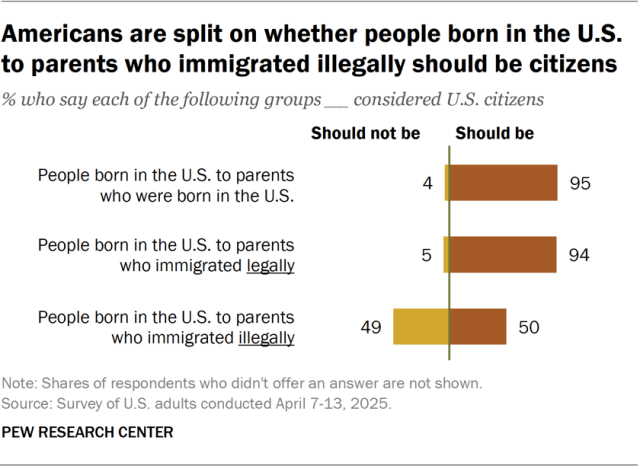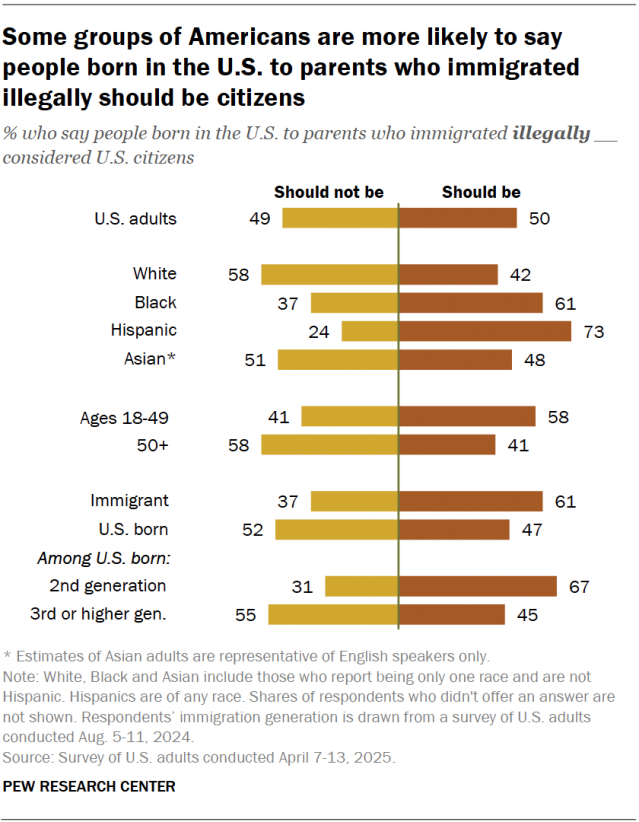Half of U.S. adults say people born in the United States to parents who immigrated illegally should have U.S. citizenship. Another 49% say they should not, according to a Pew Research Center survey conducted in April.

By contrast, nearly all U.S. adults say people born in the country to U.S.-born parents (95%) or to parents who immigrated legally (94%) should be citizens.
The public’s views about birthright citizenship for each of these groups are unchanged since August 2024.
The 14th Amendment of the U.S. Constitution guarantees citizenship to people born on U.S. soil, no matter the legal status of their parents. This right has been in place since 1868.
However, in January, President Donald Trump signed an executive order that would end birthright citizenship for people born to parents who are unlawfully in the U.S. and to parents who are temporary visa holders, including those holding student, work or tourist visas. Several federal judges have since blocked the order nationwide and the case is now before the Supreme Court. A ruling is expected by early summer.
Views by race and ethnicity, age, and place of birth
Some U.S. adults are more likely than others to say people born to parents who immigrated illegally should be U.S. citizens.

- Hispanic and Black adults: Majorities of Hispanic (73%) and Black (61%) adults say these people should be U.S. citizens. But smaller shares of English-speaking Asian (48%) and White (42%) adults agree.
- Adults ages 18 to 49: 58% say this, compared with 41% of those 50 and older.
- Immigrants: 61% say this, compared with 47% of U.S.-born adults.
- Second-generation Americans: U.S.-born adults with immigrant parents are more likely than third- or higher-generation Americans to say this (67% vs. 45%).
Views by political party
A 48 percentage point gap separates Democrats and Republicans on whether citizenship should be granted to people born in the U.S. to parents who immigrated illegally.

Some 74% of Democrats and Democratic-leaning independents say this, compared with 25% of Republicans and Republican leaners.
There are also partisan gaps among many groups of Americans. For example, 75% of White Democrats support birthright citizenship in this case, compared with 18% of White Republicans, a 57-point difference.
Other demographic groups have narrower but still sizable partisan gaps:
- 85% of Hispanic Democrats and 55% of Hispanic Republicans say people born to parents who immigrated illegally should be U.S. citizens, a 30-point difference.
- 61% of Asian Democrats and 26% of Asian Republicans support birthright citizenship in this situation, a 35-point difference. (There were not enough Black Republicans in our sample to analyze their views separately.)
- Among immigrants, 74% of Democrats and 38% of Republicans support birthright citizenship for those born to parents who immigrated illegally – a 36-point gap.
Note: Here are the questions used for this analysis, the topline and the April 2025 survey’s methodology.


